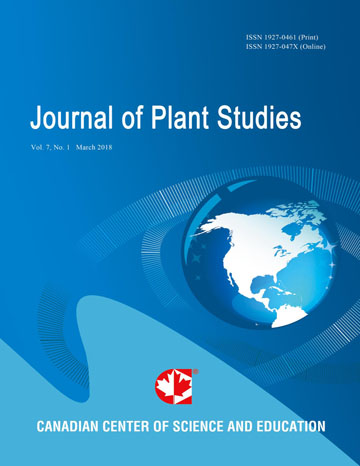Physiological Behavior of Potato cv. Tollocan at Diverse Types of Salinity
- Edgar Ivan Bernal
- Marco Antonio Escobar
- Anastacio Leon
- Hector Manuel Escobar
Abstract
The objective of this experiment was to analyze the growth of Solanum tuberosum cv. Tollocan under sulphate-hydrochloric, hydrochloric-sulphate and sulphate-sodium soil salinities at various concentrations, as occurs in soils where potatoes are grown in Mexico (Toluca Valley, highlands of Nuevo León and foothills of the Laguna del Carmen in Tlaxcala) with damages to the crop yield by salt stress. For this purpose a greenhouse experiment was conducted with randomized complete block design composed by three treatments and three repetitions. This consisted of planting tubers and growing plants in pots with perlite, and subjecting them to irrigation with saline solutions prepared in the laboratory at electrical conductivities from 0 to 15.0 dS m-1, whose ionic relations of ?1.5, , allowed simulating those induced by salinities in field. The physiological behavior of plants in the vegetative stage of tuberization and tuber filling was evaluated using as variables the number of leaves, leaf area index, net photosynthesis, shoot length, root length and number and diameter of tubers per plant. Likewise its biomass accumulation and tolerance to each salinity was determined. Results indicate a severe reduction in growth, presence of secondary tubers and formation of small potato tubers in plants subjected to sulphate-hydrochloric and hydrochloric sulphate salinities from an electrical conductivity > 6.0 dS m-1, so that cv. Tollocan is considered sensitive to these conditions. The reduction was more drastic and significant with P= 0.05 in sulphate-sodium salinity, since 3.88 dS m-1 of electrical conductivity, dwarf plants grew without forming tubers and thus, are considered hypersensitive to this salinity.
- Full Text:
 PDF
PDF
- DOI:10.5539/jps.v2n1p120
Index
- AGRICOLA
- CAB Abstracts
- CABI
- CAS (American Chemical Society)
- CNKI Scholar
- Elektronische Zeitschriftenbibliothek (EZB)
- Excellence in Research for Australia (ERA)
- Google Scholar
- JournalTOCs
- Mendeley
- Open policy finder
- Scilit
- Standard Periodical Directory
- Technische Informationsbibliothek (TIB)
- WorldCat
Contact
- Joan LeeEditorial Assistant
- jps@ccsenet.org
